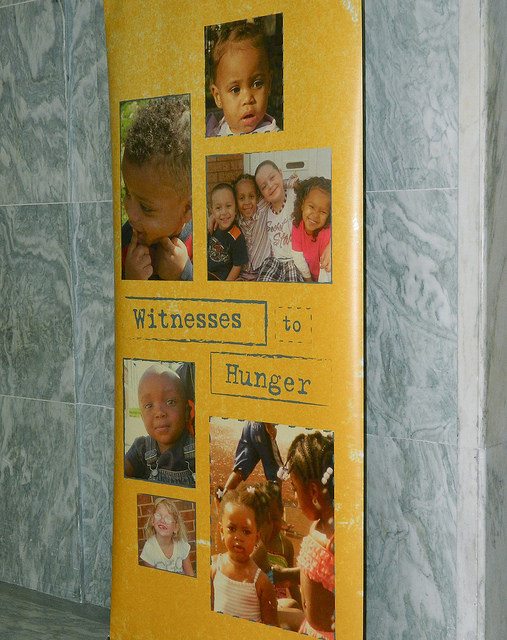As the old saying goes, “a picture is worth a thousand words.”
A project called Witnesses to Hunger hopes that photographs of needy children, taken by their mothers and caregivers, can go where words have sometimes failed: to demonstrate the need for programs and policies to help break the cycle of poverty throughout the United States.
On Friday, April 4, members of Congress held a Witnesses to Hunger exhibit in the Rayburn Foyer of the Rayburn House Office Building. Democratic Rep. Barbara Lee of California, an advocate for anti-poverty programs, helped organize the exhibit as part of a larger discussion of hunger and poverty on Capitol Hill. She was joined by Reps. Rosa DeLauro of Connecticut and James McGovern of Massachusetts as well as Mariana Chilton, Associate Professor of Public Health at the Drexel University of Public Health.
Remarks focused on the importance of reforms to help move families out of poverty.
“The poor in this country don’t have a place at the table,” said McGovern. “Being poor in this country is hard work.” McGovern emphasized that the photos on display at the were examples of how many families can’t afford to put food on their tables and more needs to be done about the issues of poverty.
“We stand shoulder to shoulder with you,” DeLauro said.
Witnesses to Hunger began as a project in Philadelphia 2008 with mothers and caregivers of young children. In order to break the cycle of poverty, the men and women of Witnesses to Hunger advocate for increased wages so families can become self-sufficient, improving the nutrition and health programs, establishing safe environments for families, especially children, and expanding educational opportunities. Witnesses to Hunger has since expanded to other cities including Boston, Baltimore, and Camden, New Jersey.
Angela Sutton, an original founder of Witnesses to Hunger, thanked those who have helped raise awareness of poverty. “Without you, we wouldn’t be able to make a difference,” she said.
Spending cuts have recently impacted families who rely on food stamps for basic nutrition. “Enough is enough,” said Sutton. “For [budgets] to be cut so short … it’s against civil rights.”
Tamara Santiago, a Boston Witness, spoke of life as a young mother weighing the decision to either pay rent or to buy food. She said food for her son had to come first.
“If I feed him properly, he’ll be able to grow,” said Santiago.
And the worries of many of the parents and witnesses extended beyond food. Many also expressed concerned about domestic abuse and neighborhood safety. Santiago’s photo on display at the exhibit was a photograph of a building with security cameras. The caption of the photo spoke of the irony of the presence of security cameras in a community where little is done to actually keep residents safe.
Santiago urged her audience not to forget the images they had seen.
“We’re all here fighting for the same cause,” Santiago said. “We’re like sisters because we share the same struggles and face the same problems.”








